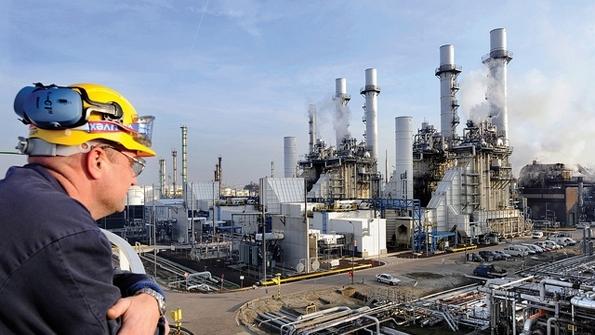
SHELL PROFIT FALLS

Royal Dutch Shell said Wednesday that its first-quarter profit fell 44% from a year earlier as it recorded a $2.86 billion impairment charge, largely on refineries in Asia and Europe.
But the Anglo-Dutch oil giant posted lower declines across its businesses than some investors expected, and its shares jumped by nearly 4.5% after the earnings announcement.
Shell's first-quarter profit on a current cost-of-supplies basis—a figure that factors out the impact of inventories, making it equivalent to the net profit reported by U.S. oil companies—was $4.47 billion. But excluding one-time items, including the refining write-down, quarterly profit was $7.33 billion, down 3% from a year earlier.
First-quarter revenue fell to $109.66 billion in the quarter, from $112.81 billion a year earlier, while net profit fell 45%, to $4.51 billion.
Oil and gas production during the quarter was 3.25 million barrels of oil equivalent a day, 4% below the first quarter of 2013.
The results were the first for the oil giant under the leadership of Ben van Beurden, who took over as chief executive in January with a plan to cut costs across the sprawling company.
After years of rising expenses and poor refining profits in recent quarters, investors have been skeptical of big, integrated oil firms. The rise in Shell's share price Wednesday on news of a write-down and declining production, revenue and profit shows how low those expectations have fallen. Shell performed particularly poorly in the fourth quarter of last year, when CCS earnings fell 71% and the company announced its first profit warning in a decade.
In contrast, said Iain Pyle, an analyst with Bernstein Research, the first quarter "was kind of a quarter where everything went right."
Shell said its income from liquefied natural gas increased, while refining on the Gulf of Mexico coast did better than some analysts expected, Mr. Pyle said, because of favorable oil prices there.
But other parts of the processing, or downstream, business performed poorly.
"The impairments we have announced today in downstream reflect Shell's updated views on the outlook for refining margins," Mr. van Beurden said.
Shell's chief financial officer, Simon Henry, said the refining business would have continuing troubles as a result of weak demand, while new refineries in Saudi Arabia, China and India were contributing to "a huge oversupply."
Shell has been reviewing its own processing facilities, figuring out whether to "keep or divest," he said.
The company decided to keep a Singapore refinery and try to increase its profitability. But the bad outlook, Mr. Henry said, forced the company to take a write-down on the refinery as well as on some assets in Europe. The company has recently made deals to reduce downstream holdings in Norway, Italy and the Czech Republic.
European refineries have been struggling for years with weak demand and increased competition from modern plants in Asia and the Middle East—as well as U.S. refineries that have benefited from lower costs thanks to the shale-oil boom.
According to the International Energy Agency, Europe lost some 2 million barrels a day of refining capacity in between 2008 and 2013 as facilities closed, yet capacity still outstrips demand.
Earlier this week, BP reported the pretax profit for its downstream division dropped more than 50% in the first quarter because of the difficult refining market. Italian oil major Eni SpA also blamed, at least in part, the 14% fall in its net profit last quarter on weak refining margins.
In an interview last month, Mr. van Beurden said the company will continue reviewing which properties it can manage profitably and which ones it can sell.
In an effort to improve returns, Mr. van Beurden also said he would scale back Shell's spending on new projects. Shell's net capital spending in the first quarter totaled $10.1 billion, compared with $8.2 billion in the same period last year.
In an effort to turn around Shell's U.S. division, which has struggled with disappointing performance from its shale properties, Shell said it would sell shale holdings in Texas and the Rocky Mountains.
The company declared a dividend of $0.47 per ordinary share, in line with its previous guidance of $0.47 a share and 4% above last year's $0.45.
wsj.com




